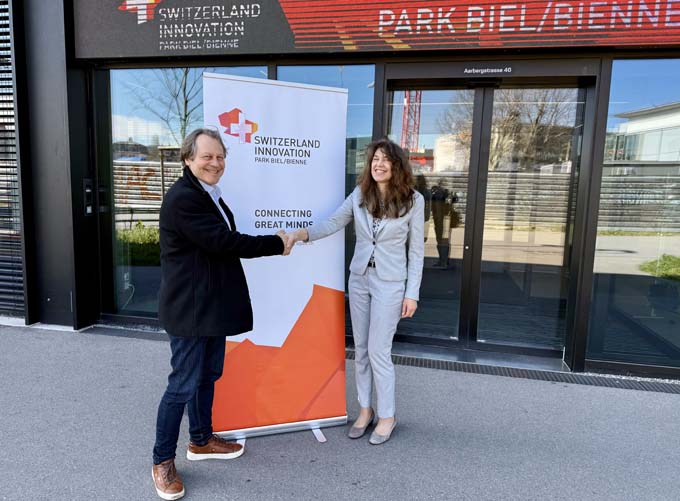Excellence and pragmatism
Managers should create an environment for outstanding performance. This requires pragmatically applied quality management, common sense and a corporate culture in which "soft factors" such as emotions, values and responsibility are actively cultivated.

Since 2000, the Swiss Paraplegics Association - SPV for short - has been committed to quality management according to the EFQM model and has implemented state-of-the-art management ideas. During its introduction, the SNI was faced with the challenge of transforming an umbrella organisation with over 11,000 members from its pioneering days into a modern, customer-oriented organisation. For a non-profit organization in particular, it is important that the management and staff work efficiently and effectively and that no resources are wasted. Finally, one must be accountable to external donors for the use of the funds received.
EFQM Award
It can therefore be considered fortunate that Dr. Thomas Troger, SNI director and president of the ESPRIX Foundation, was able to integrate the EFQM model and his leadership concept, which he presented in 2005 in his book "Appreciative Leadership - Leadership from the Inside Causes Waves", into the change process. The fact that the model and the concept are actively lived is proven by the EFQM's four-star award (Recognized for Excellence). In December 2009, a
Four-star EFQM award
In particular, they attested that SPV's strategy, processes and management model are optimally aligned and that the executives practice strong partner management. According to the assessors, this is reflected in the strong focus on results and the positive course of business, satisfied customers and, probably the most important point, a motivated and satisfied workforce.
But what remained of it?
Is the purpose of an external EFQM assessment to gain fame and glory? Certainly, because especially as a non-profit organization with little or no competition, it is important to prove to donors, clients and partners that the quality of the services provided is right, that no money is wasted and that the client's benefit is at the center of the actions.
But not only that. The SNI was also primarily concerned with continuing to engage the employees on this path of excellence even more intensively. We wanted to let them celebrate the success of their work and commitment and show them how we compare with other companies.
Since we decided on an on-site assessment, we knew that every single employee could be questioned - spontaneously and on very different topics. This caused anxiety among the staff, who were informed and involved from the very beginning. We therefore integrated everyone into the process in several courses. Not only did we explain the EFQM model to them again, but we also went into greater depth on strategic aspects and showed them how and to what extent the EFQM can be applied.
The whole workforce was involved
We want to know how much everyone contributes to the implementation of our strategy, what our processes are and how important our culture and values are.
It was like putting many puzzle pieces together to form one big picture. The individual pieces were known; after all, the SNI had been living the model for years. Each individual contributed to strategy fulfillment within their sphere of influence, had their MbO goals, and knew which activities belonged to which process. And yet, seeing the whole big picture in front of you is something else. You have to set aside time to do that. It was very important for everyone to pick up the mission statement again, to read the leadership principles or to ask themselves how much each individual contributes to the company vision. Or to define for themselves what quality really means. This "involvement" led to a strengthening of the identity and the performance culture, so that in the end the score was the success of the entire staff and not just the project team or the management.
Culture of appreciative leadership
This approach is not only suitable for small, manageable organisations. We are convinced that it would also be right and important in larger companies to involve not only a project team, but all employees in quality management and in such an assessment project. Although it is a universally
It is a well-known fact that everyone should think entrepreneurially. But is this really lived? Or only to achieve financial goals and save costs? It needs more. Especially if you want to perceive and treat your customers as people and partners.
Wherever quality is concerned, the SNI therefore does not focus primarily on the system, the structures or the processes, but first on the soft factors, the corporate culture, personal responsibility and, above all, leadership behavior. Only when these are right can changes be made to the hard factors, such as processes and procedures. We consider the role model function of management and supervisors to be the most important driver of corporate culture. Values and action maxims can only be implemented in everyday life at the grassroots level if they are exemplified.
climate of confidence
If you follow this path, which we call appreciative leadership, you don't have to constantly lecture individuals and tell them what they should do and how. But that means moving away from the elbow mentality and toward a culture of trust and transparency. This requires the courage to create strong per
Efficiency through appreciation
It is important to allow personalities who are sometimes better than their boss. The boss must not be offended in his ego. His function is not primarily to be able to do everything better, but to create ideal conditions so that all existing potentials can be used. And when we talk about potentials, we are not only talking about knowledge and know-how, but also about human competences. Honesty, self-criticism and consistency are basic requirements for a good leader.
One can therefore legitimately wonder whether many recruiters have not yet understood this. They would have to deal more intensively with the personalities and characters on the other side of the table in recruitment interviews and less with certificates and diplomas. Gaps in knowledge can be closed, changing a mindset is much more difficult.
It should also be noted that in a good working atmosphere, the quality of performance automatically increases. People are less often ill, suffer less burn-out and there are hardly any cases of mobbing. For this
Managers need courage
better work performance has a positive effect on customer satisfaction and customer loyalty.
Regular surveys at the SNI prove this causal relationship. Employee satisfaction has risen from 75 to a high 90 percent since the turn of the millennium. In terms of customer satisfaction, we are talking about an average of up to 87 percent. This is high, especially when you consider that our members are paraplegics who need to obtain services from us, and there is no competition for many of our offerings.
The courage to be pragmatic
Of course, the assessment also identified weaknesses. Most of them were known to us in advance. The SNI has always implemented only those elements of the EFQM model that it is convinced bring a lot to the organization. Unnecessary
Saying no when necessary
Bureaucracy is deliberately avoided. Even in the preparation of the assessment, the management weighed every measure for improvement in detail. Just to maximize the score, an idea was not implemented. The added value for the organization and the customers were in the foreground.
Anyone who wants to take a company further along the path of excellence is always at crossroads. They have to be prepared to take new, unknown directions - possibly even the wrong ones. Because those who make decisions only when they are sure of success often arrive too late. It may well be that one has to admit to a wrong decision in order to then initiate improvements. This is where leadership skills come into play again. Managers and employees must take responsibility for their actions, admit mistakes and be prepared to correct them through improvement measures. This is why communication, both internally and externally, is a top priority in successful companies.
People at the centre
In summary, it is advisable to focus on a holistic management culture that places people and not systems and processes alone at the centre. This is also needed as clear guidelines and specifications, but not as an end in itself. It is therefore advantageous to encourage personal initiative and responsibility. The best place to start is where it is most effective - with oneself. It is therefore important to first analyse the management guidelines and one's own management behaviour. And only then should you check whether the appropriate management system is in place.
The best place to start is with yourself
is set. This quickly brings managers further - to the advantage and benefit of the organization and the customers, but above all to the benefit of the employees.









